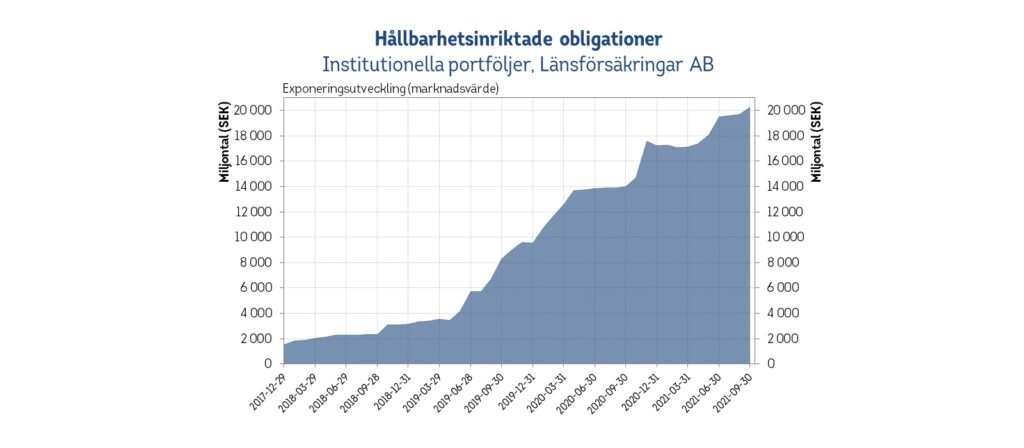ICMIF member Länsförsäkringar (Sweden) has been pursuing a climate-smart vision since 2019, with the long-term aim of managing climate risks and adapting investments to the climate targets of The Paris Agreement.
Last month, Länsförsäkringar made further steps towards this: launching a new climate-orientated fund and announcing new climate-related exclusion criteria for investments in companies that are active in exploration and extraction of oil and gas.
Since adopting a climate-smart vision, Länsförsäkringar’s own funds and investment portfolios must be in line with the Paris Agreement and have an emission level that contributes to limiting global warming to 1.5˚C by 2030.
The Global Climate Index Fund is a further development from Länsförsäkringar’s FossilSmart fund, which is now changing its name. The fund is the fourth in a series of sustainability-oriented funds launched in recent years.
The fund will be managed according to a benchmark index that takes into account climate aspects. It has a higher level of sustainability than other index funds by following extended climate-related exclusion criteria and by favouring companies that have products and services with positive climate effects.
“We want even more people to be able to save with regard to the climate and we see that interest in this type of saving alternative is increasing. The fund will contribute to increased sustainability by investing more in so-called solution companies compared to what a traditional, global index fund does. The solution companies work to develop products and services that reduce the climate footprint, such as alternative energy sources or environmental technology. In this fund, we increase the proportion of solution companies from 4% to 26% compared with the old fund FossilSmart”, says Sofia Aulin (pictured), Sustainability Manager at Länsförsäkringar Fondförvaltning (the asset management arm of Länsförsäkringar).
Facts about the Global Climate Index Fund:
- The fund excludes fossil fuels (extraction and production of fossil fuels).
- The fund excludes companies with high carbon dioxide emissions.
- The fund has a higher proportion of solution companies compared with MSCI, which makes the assessment of which companies are solution companies.
- The fund has a higher proportion of solution companies according to MSCI’s definition, currently 26% compared with 3%for their benchmark index.
- The carbon footprint of the Global Climate Index is 80% lower than that of MSCI World.
- The fund follows Länsförsäkringar’s ordinary exclusion list
- The fund lowers the management fee from 0.7% to 0.6%.
In another step towards the climate-smart vision, Länsförsäkringar announced new criteria that excludes companies that are active in exploration and extraction of oil and gas in their own funds and investment portfolios for Länsförsäkringar Liv, Fondliv and Sak.
“In order to limit global warming, the use of fossil fuels must be significantly reduced. Investments in fossil fuel companies are both a climate risk and a financial risk. Few oil and gas companies have begun to restructure their operations in line with the climate agreement. In addition, they risk sitting on assets that can lose a significant amount of value, and thus become so-called stranded assets”, says Sofia Aulin.
The new criteria mean that 15 companies have been sold off from Länsförsäkringar’s investments, but more than 220 companies have been identified as excluded for the company to invest in. Länsförsäkringar has previously excluded more than 90 companies whose activities are mainly fossil fuel extraction and energy production with coal.
“We started phasing out coal companies as early as 2015 and have since gradually reduced our exposure to fossil fuel companies as a result of the financial and climate-related risks that these companies have. Many companies in the energy sector have made a loss or had reduced profit margins for a long time, both as a result of price wars but also as a result of reduced demand in connection with the virus outbreak. The world index has for a long time developed better than companies in the energy sector” says Kristofer Dreiman, Head of Responsible Investments.
“In parallel with the introduction of criteria for fossil fuel companies, we have chosen to invest in forest companies based on its positive climate effects and business opportunities in the societal transformation. The next step in the work with our climate-smart vision is to develop criteria for optimizing exposure to companies based on how climate-efficient they are in their operations”.
New climate-related exclusion criteria:
- Companies whose turnover from exploration and conventional extraction of oil and gas exceeds 50%.
- Companies whose turnover from unconventional extraction of oil and gas (for example oil sands, fracking and extraction of gas from coal) exceeds 5%.
Existing climate-related exclusion criteria:
- Mining companies that have more than 5% of sales from coal.
- Energy companies that have more than 5% of turnover from incineration coal, with the exception of selected companies that are judged to restructure their operations, so-called conversion companies. This means that investments can be made in energy companies that have up to 20% of the turnover from incineration coal if the companies have set targets in accordance with the Paris Agreement and/or that the turnover from renewable energy exceeds the turnover from fossil fuels.
- Companies with significant oil reserves and production where the conditions for meaningful advocacy work with the company are judged to be insufficient.
The exclusion of fossil fuels also contributes to Global Goal 13 of the UN Sustainable Development Goals (SDGs) on combating climate change and its impacts, one of the seven SDGs that Länsförsäkringar is focused on.






